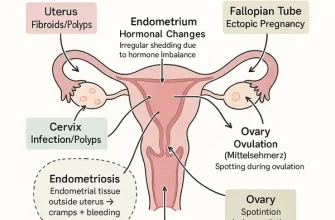Have you noticed changes in your menstrual cycle since starting Ozempic? You’re not alone. As the popularity of Ozempic—a medication originally designed for type 2 diabetes—has skyrocketed, particularly among individuals seeking weight loss, questions around its impact on women’s health have emerged. Specifically, many have been wondering: Does Ozempic affect the menstrual cycle? Let’s dig into the facts.
What is Ozempic, and How Does It Work?
Ozempic (semaglutide) is a GLP-1 receptor agonist, designed to help manage blood sugar levels in type 2 diabetes by mimicking a natural hormone that stimulates insulin release. In recent years, however, it has been frequently prescribed off-label for weight loss. Ozempic works by slowing down digestion, reducing hunger, and consequently leading to weight loss—a property that has made it popular outside of diabetic use.
Could Ozempic Impact Your Hormones?
Ozempic affects the way the body handles food and energy, but what about hormones, particularly those involved in the menstrual cycle? The answer lies largely in weight loss. A significant drop in body weight can influence the production of reproductive hormones like estrogen and progesterone, leading to disruptions in the menstrual cycle.
Did you know? Significant weight loss—whether intentional or due to medication—can affect the hypothalamic-pituitary-ovarian axis, which regulates the menstrual cycle. A 2023 study published in Endocrinology Reviews found that rapid weight changes, like those caused by GLP-1 agonists, can impact menstrual regularity in as many as 25% of women.
Real Experiences: What Are Women Reporting?
Women who take Ozempic have shared experiences ranging from delayed periods to complete cessation of menstruation. One survey conducted among Ozempic users found that approximately 20% reported experiencing some form of menstrual irregularity after beginning treatment.
Common changes reported include:
- Irregular Cycles: Some women reported longer gaps between their periods, while others experienced more frequent bleeding.
- Missed Periods: A sudden weight drop can lead to amenorrhea (missed periods), particularly when the body perceives a drastic caloric deficit.
- Heavier or Lighter Flow: Hormonal fluctuations can also affect the flow, making periods unexpectedly heavy or noticeably lighter.
The Science Behind Menstrual Changes on Ozempic
The menstrual cycle is highly sensitive to changes in energy balance. When your body loses weight—especially rapidly—it may interpret this as a form of stress, which can lead to decreased production of the hormone GnRH (gonadotropin-releasing hormone). GnRH plays a crucial role in regulating ovulation, and when levels drop, the menstrual cycle can become irregular.
Weight loss also leads to reduced body fat, which in turn lowers estrogen levels since adipose tissue is a key site of estrogen production. This decrease can significantly impact ovulatory cycles.
Are These Changes Dangerous?
Is it dangerous to have these changes in your menstrual cycle? The answer depends on the individual. For some, a temporary disruption may be harmless, but if you experience prolonged irregularities, it may be an indicator that your body is not handling the weight loss well. Chronic disruptions can impact bone density, cardiovascular health, and future fertility.
What Can You Do If You Notice Changes?
If you’re experiencing irregular menstrual cycles while taking Ozempic, it’s important to:
- Track Your Symptoms: Use an app or journal to track changes in your cycle—how often, how heavy, or how different it feels compared to your usual pattern.
- Consult a Healthcare Professional: It’s crucial to speak with your doctor if your cycle becomes very irregular, especially if you’re trying to conceive or if these changes last longer than a few months.
- Nutrition and Balance: Ensure you are getting adequate nutrients. Dramatic weight loss can lead to deficiencies, particularly in essential fats that play a role in hormone production.
Did you know? A healthy menstrual cycle is often considered a marker of overall well-being. If your body is healthy, your menstrual cycle is more likely to be regular. Chronic irregularities can be a sign that your body is under stress or nutrient deficient. (American College of Obstetricians and Gynecologists, 2022)
The Bigger Picture: Ozempic, Weight Loss, and Your Health
The popularity of Ozempic for weight loss continues to rise, and it’s easy to see why—it works. On average, patients lose 15-20% of their body weight within 68 weeks, a figure that surpasses many other weight loss treatments available today. But this success isn’t without side effects. Beyond the menstrual cycle, side effects can include gastrointestinal issues, potential gallbladder problems, and changes in appetite.
Price Check: Ozempic can be expensive. Monthly costs can range between $900 and $1,200 depending on your location and the dosage prescribed.
Our Editorial Advice: Balance is Key
Ozempic is an effective tool for weight loss, but it is not without its challenges. If you notice changes in your menstrual cycle, understand that your body is likely reacting to significant changes in weight and metabolism. Maintain an open dialogue with your healthcare provider, and be mindful of your body’s signals. Weight loss is about achieving health, not compromising it.
Ensuring that you’re losing weight in a healthy, balanced manner—with enough nutrients, monitoring hormone levels, and listening to your body—will help you maintain not just your desired weight, but also overall well-being.









